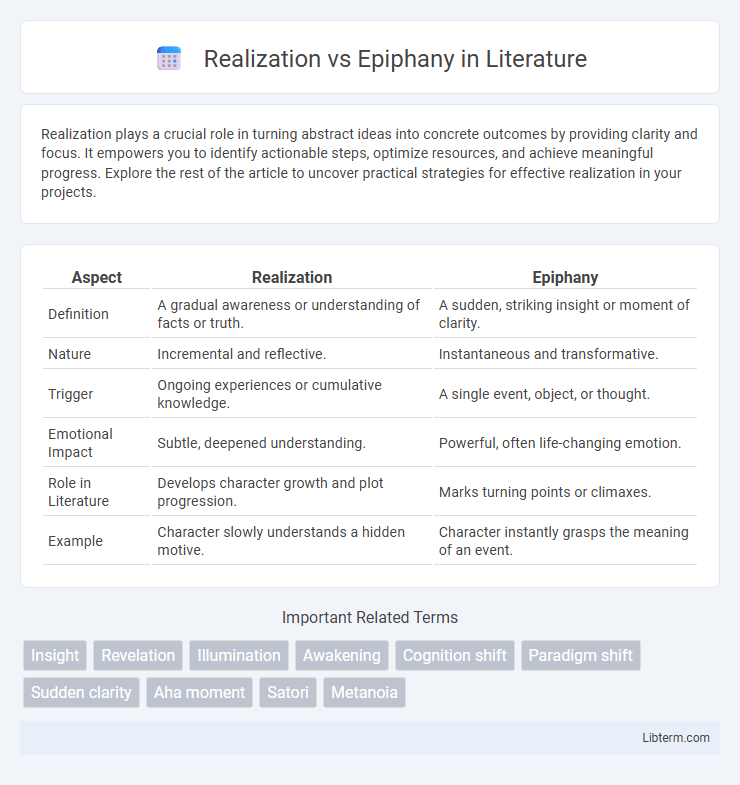Realization plays a crucial role in turning abstract ideas into concrete outcomes by providing clarity and focus. It empowers you to identify actionable steps, optimize resources, and achieve meaningful progress. Explore the rest of the article to uncover practical strategies for effective realization in your projects.
Table of Comparison
| Aspect | Realization | Epiphany |
|---|---|---|
| Definition | A gradual awareness or understanding of facts or truth. | A sudden, striking insight or moment of clarity. |
| Nature | Incremental and reflective. | Instantaneous and transformative. |
| Trigger | Ongoing experiences or cumulative knowledge. | A single event, object, or thought. |
| Emotional Impact | Subtle, deepened understanding. | Powerful, often life-changing emotion. |
| Role in Literature | Develops character growth and plot progression. | Marks turning points or climaxes. |
| Example | Character slowly understands a hidden motive. | Character instantly grasps the meaning of an event. |
Understanding Realization: A Clear Definition
Understanding realization involves recognizing a gradual cognitive process where new information or insights are consciously integrated into existing knowledge frameworks. It represents a methodical awareness that develops over time, enhancing comprehension and decision-making abilities. Realization contrasts with epiphany, as it emphasizes steady mental assimilation rather than sudden, dramatic insight.
What Is an Epiphany? Key Characteristics
An epiphany is a sudden and profound moment of insight or revelation that transforms one's understanding of a situation or concept. Characterized by clarity, emotional impact, and often a shift in perspective, an epiphany transcends ordinary realization by triggering deep personal significance. This pivotal experience frequently leads to immediate changes in thinking, behavior, or belief systems, marking it as a critical turning point in cognitive and emotional development.
Realization vs. Epiphany: Core Differences
Realization is a gradual cognitive process where understanding or awareness develops over time through reflection or experience, while an epiphany is a sudden, intense moment of clarity or insight that radically shifts perception. Realizations often build upon accumulated knowledge, leading to a reasoned conclusion, whereas epiphanies typically occur spontaneously, triggering immediate transformation in thought or behavior. The core difference lies in the timing and intensity of awareness--realization unfolds progressively, epiphany emerges instantaneously.
Psychological Processes Behind Realizations
Realizations often emerge through gradual cognitive processing, where the brain reorganizes existing knowledge to form new connections, facilitating a conscious understanding. This process involves memory retrieval, pattern recognition, and the integration of novel information, which collectively trigger a shift in perspective. Epiphanies, in contrast, are sudden and intense moments of insight driven by unconscious problem-solving and emotional arousal that rapidly restructure mental frameworks.
The Sudden Nature of Epiphanies
Epiphanies are characterized by their sudden and profound impact, often sparking instant clarity or insight without prior warning. Unlike gradual realizations that develop over time through reflection and accumulation of knowledge, epiphanies occur spontaneously, triggering an immediate shift in understanding or perspective. This abrupt nature distinguishes epiphanies as powerful cognitive events that can redefine an individual's perception almost instantaneously.
Everyday Examples of Realizations
Realization often occurs through everyday experiences, such as noticing a budget imbalance after reviewing monthly expenses or recognizing the importance of communication during a minor disagreement with a colleague. These moments involve gradual awareness based on observation and reflection, distinct from epiphanies which are sudden, profound insights. Understanding everyday realizations can enhance self-awareness and decision-making by highlighting incremental cognitive shifts.
Life-Changing Moments: Famous Epiphanies
Life-changing moments often hinge on the distinction between realization and epiphany, where realization involves gradual understanding, while epiphany triggers sudden, profound insight. Famous epiphanies such as Archimedes' "Eureka" moment or Steve Jobs' vision for Apple highlight how immediate clarity can redefine personal and professional trajectories. These transformative insights catalyze innovation, alter perspectives, and drive significant life changes, underscoring the power of sudden cognitive breakthroughs.
Impact on Personal Growth and Decision-Making
Realization triggers awareness of existing knowledge or circumstances, fostering gradual personal growth through reflective understanding. Epiphany delivers sudden, transformative insight that can dramatically shift perspectives and accelerate decision-making processes. Both play crucial roles in self-improvement, with realization building steady progress and epiphany sparking immediate change.
Triggers: What Sparks a Realization or Epiphany?
Triggers for realization often stem from accumulating evidence or a gradual process of understanding, where repeated experiences or new information lead to a clear insight. Epiphanies are usually sparked by sudden, intense moments of clarity, frequently triggered by unexpected events, emotional breakthroughs, or novel connections between disparate ideas. Both processes engage the brain's pattern recognition and emotional centers but differ in tempo and intensity.
Integrating Insights: Moving from Awareness to Action
Realization marks the moment of awareness when new information or understanding becomes clear, while epiphany represents a sudden, transformative insight that profoundly shifts perspective. Integrating insights requires consciously applying this newfound knowledge into practical steps, bridging the gap between passive awareness and deliberate action. Effective integration enhances decision-making and problem-solving by embedding deeper understanding into real-world scenarios.
Realization Infographic

 libterm.com
libterm.com